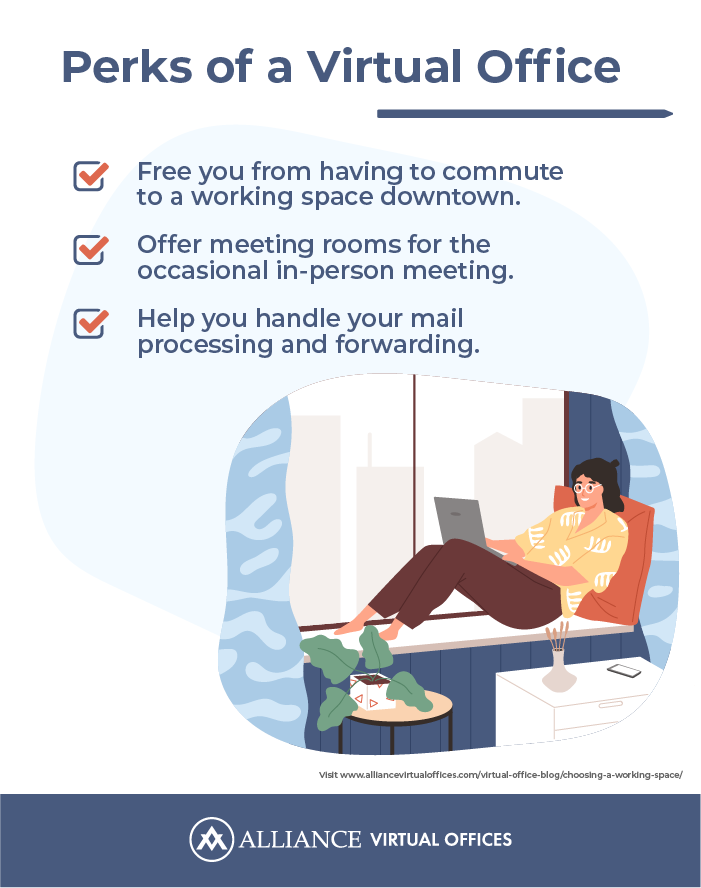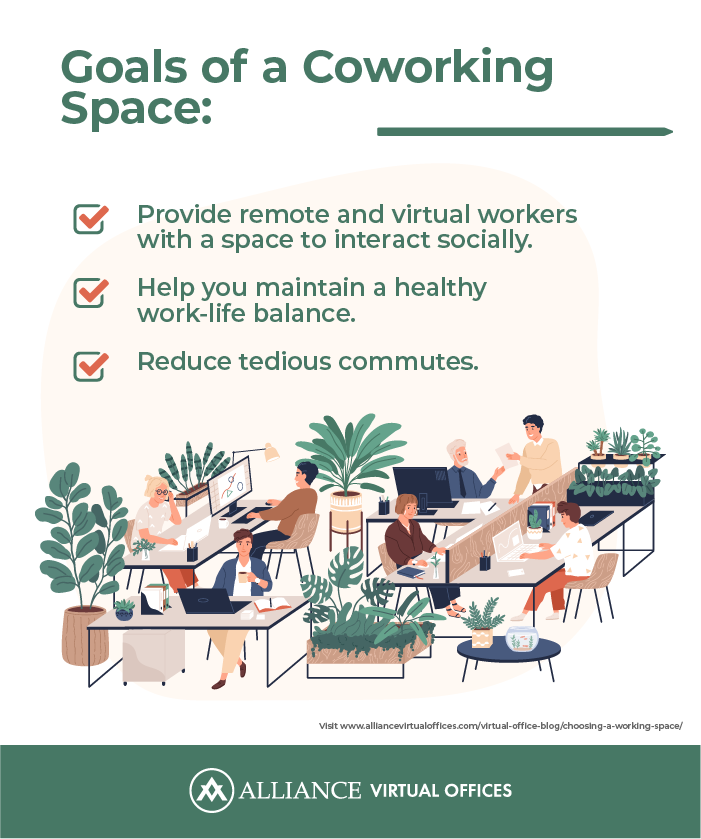- What is a virtual office?
- What is a coworking space?
- Which working space is right for your business?
Q: What’s the difference between a virtual office and a coworking space?
A: Virtual offices provide companies with a recognized business address, mail handling, and on-demand office space or meeting rooms, without paying for a full-time office rental. Coworking is a hospitality-driven flexible working environment that allows entrepreneurs from different organizations to share workspace and amenities, often in a community-focused environment.
The modern working space has changed radically in the past decade.
While work was once synonymous with a traditional office, storefront, or job site, nowadays you can work from just about anywhere.
Remote work has exploded in popularity, and with small business formation booming during the pandemic, interest in flexible workspaces has grown exponentially.
There are many different ways to work flexibly, and various solutions on the market to support individual working preferences. Among them are virtual offices and coworking spaces – two highly popular solutions that offer different levels of workspace flexibility.
We get it — small business owners and self-employed individuals don’t really have the time to research and understand the differences between workspaces.
We’re here to help.
After you finish reading this article on virtual offices and coworking spaces, you’ll understand the differences and similarities so that you can choose the best workspace for your unique needs.
- What is a virtual office?
- What is a coworking space?
- Are coworking spaces a type of virtual office?
- Which working space is right for your small business?
The Rise of the Modern Working Space
The shift from traditional offices to remote working didn’t happen overnight.
While today remote work has become widely accepted and even celebrated, it was once considered unprofessional and ineffective.
Attitudes began shifting as increasing numbers of workers noticed the entrepreneurial possibilities of the internet. Thanks to e-commerce and digital marketing, remote operations became extremely viable for those trying to grow a business.
The pandemic only accelerated this acceptance. According to Pew Research Center, 58 percent of Americans now say the internet is essential to their day-to-day lives. This is up significantly from pre-pandemic reports.
This increased shift towards the virtual space has been compounded by a rise in small businesses and entrepreneurs, leading to a sharp increase in demand for both virtual offices and coworking spaces.
Let’s dig into these two types of working space rental solutions and how they work.
What is a Virtual Office?
Virtual offices provide a mix of remote and physical office services.
So, what exactly is a virtual office?
Put simply, a virtual office is a combination of tools and services designed to provide you with all the benefits of a physical office, while you work remotely.
Unlike a regular office suite, you don’t rent physical working space in an office. Instead, you rent the address.
This address is located at a physical office building, and it’s one of the most important aspects of a virtual office – but why is something as simple as an address so crucial?
In order to fulfil many key requirements of running your business – such as entity registration, forming an LLC, applying for business licenses, and so on – you need to provide the government with a physical address.
You could argue that a home address does the job. But in order to separate your personal and business finances, and protect your personal assets, it’s recommended to use a commercial address.
This also builds your company’s credibility, as it reassures clients, partners, and potential lenders that your company is a legitimate organization and not a fraudulent enterprise.
In the past, most businesses were left with no choice but to simply rent an office or storefront to operate. This was the only real way to obtain an address for registration.
With the market shift to e-commerce however, this is no longer the case, and numerous businesses and entrepreneurs are now operating in a completely virtual manner. This includes using a virtual office address instead of a physical one.
Virtual offices allow decentralized businesses to operate remotely without having to rent or lease physical office space on a full-time basis. With a virtual address, you can register your business regardless of your physical location.
That said, virtual office centers do provide onsite meeting rooms and office space. This can be used as needed and paid for by the hour, offering a highly flexible workplace solution.
This gives you all the flexibility of remote working while still ensuring you have somewhere professional to meet with partners or clients.
Other features of a virtual office include:
- Mail processing and mail forwarding. Onsite receptionists receive and store mail at the virtual office center. You can stop by to collect mail during business hours, or choose to have mail forwarded to an alternative address.
- Business phone number. Rather than being tied to a desk phone or using your personal number for business calls, a virtual phone gives you a more professional business phone number with a phone system that routes calls to your cell phone, or to any WiFi-enabled device (such as a laptop).
- Remote receptionist services. In addition to a phone number, you can also get help answering calls and booking appointments. A live receptionist service utilizes a remote staff to receive calls in your company name, take messages, and forward calls as needed.
What is a Coworking Space?
While virtual offices certainly come with their fair share of advantages, they are better suited to people who spend a lot of time working remotely – for example, from home or from clients’ offices.
But what about those people who prefer the community of a traditional workspace? Or who easily get bored or lonely when confined to their home office?
A coworking space solves this issue.
Coworking spaces are flexible working spaces located throughout the US, and globally. They provide a mix of rented desks within an open, shared office, along with designated offices for private working space.
Onsite amenities usually include a variety of meeting rooms, lounge and kitchen areas, event space (if size allows), a coffee station, and a receptionist desk for receiving mail and greeting visitors.
Coworking spaces host a range of workers from several different organizations simultaneously – hence the name ‘co’ working.
The result is a collaborative, community-focused work culture that’s particularly popular with solo entrepreneurs.
With a coworking space, entrepreneurs can rent a desk in a shared workspace or commit to their own private office with full-time access.
Coworking is ideal for entrepreneurs who want a supportive, amenity-rich work environment away from the home. It’s useful for building connections and gaining inspiration from others, and is therefore popular with entrepreneurs eager to transform their startup into something bigger.
Coworking spaces aim to meet a number of specific goals:
- The first is to provide remote workers with a space to interact with other professionals. One of the biggest issues people report when working from home is a sense of isolation. Coworking spaces are a hub for remote workers, teams, and sometimes entire businesses, creating a stimulating community-focused environment.
- Secondly, coworking spaces help reduce time-consuming commutes. Because coworking spaces are widely distributed, you can find a coworking space that is convenient and close by – regardless of where you live. This means you can work near home, but you don’t have to work at home.
- Finally, coworking spaces can help you maintain a healthy work-life balance by keeping your home environment separate from your working space. When you leave the house and head to work, you’re setting a clear boundary. It’s much easier to mentally “clock out” when you arrive back home. The act of physically leaving your work behind can help you stay present and recharge when you get home.
Are Coworking Spaces a Type of Virtual Office?
Coworking spaces and virtual offices share many of the same features and services.
They both provide:
- A business address
- A place to receive mail and have it forwarded
- Meeting rooms
- Shared or private workspace (often both)
- Onsite staff to offer support, greet visitors, and set up meeting rooms
Ultimately, a coworking space provides many of the same features of a virtual office.
The main difference is that coworking spaces are set up to accommodate people who want a regular place to work, often on a full-time basis. This is reflected in the price.
A virtual office does provide physical workspace, but it’s accessible on an hourly or daily basis and paid for as needed. That’s why the cost of a virtual office is typically much lower.
Which Working Space is Right for Your Business?
The right working space depends on your business needs, but also your own personal requirements.
The first thing to consider is your personality.
If you are a highly extroverted person, you may find that working at home all day by yourself is not ideal. In this case, a virtual office alone may not be the best choice.
By contrast, a coworking space will provide you the perfect place to socialize and connect with other like-minded professionals. This can help you remain motivated and gain productivity to build your business.
On the other hand, introverted people may not need a coworking space. If you find you do your best work in a quiet environment, you may find that the best solution is to work from home and use a virtual office for your business.
Another thing to consider is your ability to maintain a healthy work-life balance.
If you find yourself unable to stop working or thinking about work after your work day is done, you’ll likely benefit from a coworking space.
Coworking spaces let you physically leave your work behind, creating clearer boundaries and keeping you from subconsciously associating your home with your work.
If this isn’t an issue for you, a virtual office can work perfectly for your small business. Just make sure you don’t let work creep into your home life.
Finally, you need to consider your employees.
If your small business has employees — especially remote employees — you may need to rent a coworking space. This gives your employees a place to work and meet clients.
If you’re a solopreneur or your employees are all perfectly content with working from home, a virtual office may be all you need.
Of course, you can also blend the two.
You may consider using a virtual office as a business address while using a coworking space as your day-to-day workplace.
This way, you can choose a downtown virtual office as your business address, and work from a more conveniently located coworking space that’s closer to home.
Conclusion
In the future of work, it’s clear that flexibility and e-commerce will continue to play an integral role. As a result, traditional office spaces are no longer the gold standard for working spaces.
If you’re looking to start or grow a small business, a virtual office will provide you with the address you need to register your business and seek growth.
For day-to-day work and to build your business network, a coworking space provides a collaborative place to work that’s professional and inspirational.
Both are flexible, service-led, and cost-efficient. They are designed to support small business owners on their entrepreneurial journey.
Want to find out more?
Further Reading
- Virtual Office: Definition and Overview
- Reconfiguring The Modern Office: Making The Shift To Virtual Long Term
- Small Business LLC or DBA? The Pros and Cons
- Here are 5 strategies to make virtual meetings more engaging
Alliance Virtual Offices provides a network of both coworking spaces and virtual offices. Chat with the team online and discover how working flexibly can help you save money, work more productively, and grow your business.









